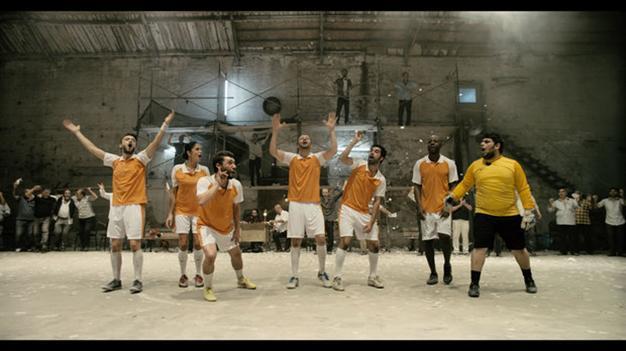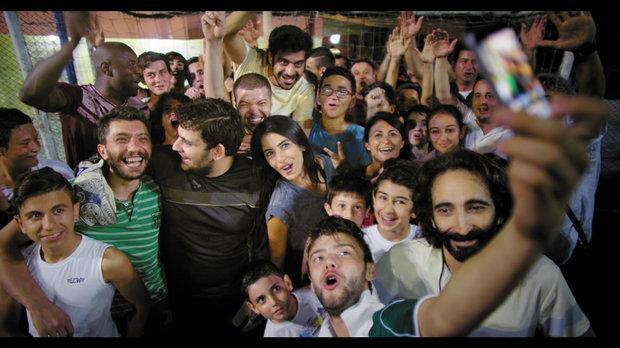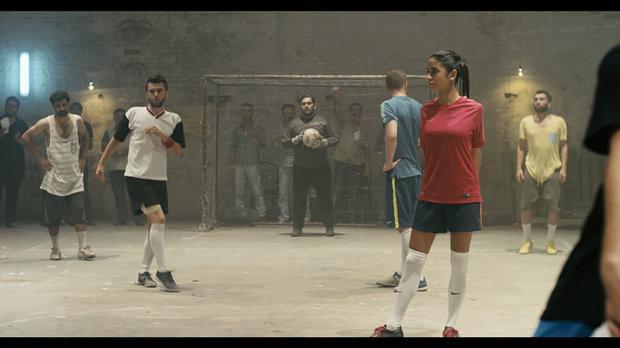Football films that aren’t really about football
Emrah Güler - ANKARA
 The recent release “Takım: Mahalle Aşkına” is a football movie. And like all football movies (or sports movies, for that matter), it’s not really about football. The translation of the title is “The Team: For the Love of the Neighborhood.” It’s about an old neighborhood fighting the moneymongers erecting high-rises and office blocks on every empty lot. It’s also about boys being boys, boys becoming men, brotherhood, family, friendship, and the changing dynamics of urban life.
The recent release “Takım: Mahalle Aşkına” is a football movie. And like all football movies (or sports movies, for that matter), it’s not really about football. The translation of the title is “The Team: For the Love of the Neighborhood.” It’s about an old neighborhood fighting the moneymongers erecting high-rises and office blocks on every empty lot. It’s also about boys being boys, boys becoming men, brotherhood, family, friendship, and the changing dynamics of urban life.Filmmakers Emre Şahin and İnan Temelkuran have trained their keen eye on class differences, decaying urban life, and the raw energy of young men. In 2009’s “40,” director and writer Şahin brought together three strangers in the underbellies of Istanbul with a mysterious bag full of money. His fast-paced drama defied any genre.
Temelkuran’s 2007 debut feature on Turkish immigrants (mostly men) in Europe, aptly titled “Made in Europe,” put him on the cultural map. In his sophomore feature, “Bornova Bornova,” Temelkuran directed his camera at young hapless men in urban Turkey.

In “Takım: Mahalle Aşkına,” Şahin and Temelkuran team as writing partners, while Şahin directs. The film follows two brothers who are helpless in the face of the booming and ruthless construction business that is eager to grab the football pitch they rent by the hour. The only foreseeable way to save their land from the construction bullies is to raise some obscene money.
The only way to raise money in a short time is by winning a championship in the upcoming street football tournament. Of course, they have to have a team to enter a tournament. Naturally, they bring together a medley of misfits from diverse backgrounds, with a woman added to the mix for a taste of romance. So goes “Takım: Mahalle Aşkına,” with a surprise role by the eccentric, retired French football player Pascal Nouma.
‘Life is like a football’
The film is the most recent in a line of football films in Turkish cinema that use football for broader themes.
Take Serdar Akar’s “Dar Alanda Kısa Paslaşmalar” (Offside), the cult hit of 2000 that told the trials and tribulations of an amateur football team in the 1980s. Memorable cameos from legendary football players Rıdvan Dilmen, Tanju Çolak and Feyyaz Uçar turned the film into a delight for football fans. The tagline, “Life is like football,” pretty much summarized the philosophical undertones of the movie.
Director and writer Volga Sorgu’s debut feature of 2011, “Kaledeki Yalnızlık” (Loneliness in the Goal) touched on themes and subjects as diverse as grief, dysfunctional family relations, class differences, changing urban life, poverty, fraud and even the lives of third-generation migrant Turks in Germany. Football as a metaphor neatly touched all of these themes, the major one being the heavy burden of being a goalkeeper in a team game.

“Life is not 90 minutes” was the tagline of another football film, Suat Oktay Şenocak’s “Camcı / Adı Aşk Bu Eziyetin” (Glassmaker / Love is the Name of this Torment) of 2010. The film featured a die-hard Bursaspor fan, Metin (named after the legendary football player Metin Oktay), who finds himself in some shady money transfer linked to football matches. The film was about fandom, as in the words of director Şenocak, “similar to the film ‘Green Street Hooligans’ on West Ham United fans.”
Last year’s “Aşk Oyunu” (Game of Love), directed by Umut Yüksel, took the game of football as a metaphor for the mating game, steering toward romantic comedy while making the football team Galatasaray and football fandom a major backdrop throughout the film. The film mostly played to Galatasaray fans, beginning with the famous voice of veteran sports commentator Orhan Ayhan, along with news clippings taking us to Galatasaray’s championship in May 2012.
For Galatasaray fans, the late Atıf Yılmaz’s “Taçsız Kral” (King without a Crown) of half a century ago is an indisputable classic. Oktay played himself in this biopic, adapted from an interview he did with the writer Safa Önal. The film is a linear narrative of Oktay’s life, who was still a popular player when the film was released in 1965. The movie included footage from football matches (far too many for non-fans of football), along with storylines of Oktay’s popularity among women, starring three beautiful actresses of the time, Ajda Pekkan, Gönül Yazar and Ayten Gökçer.
















